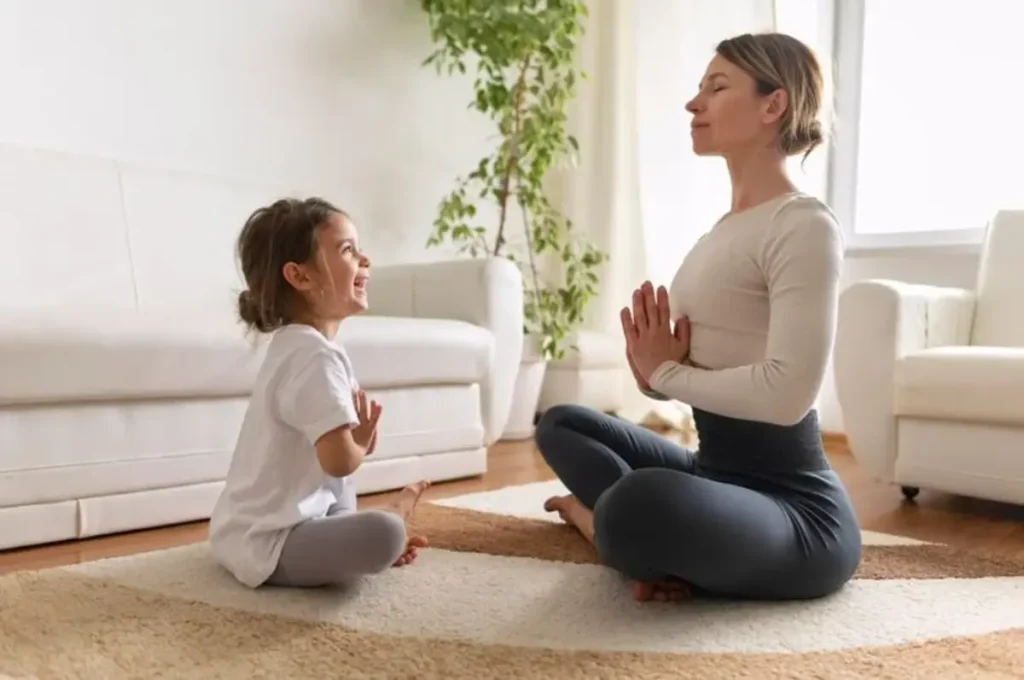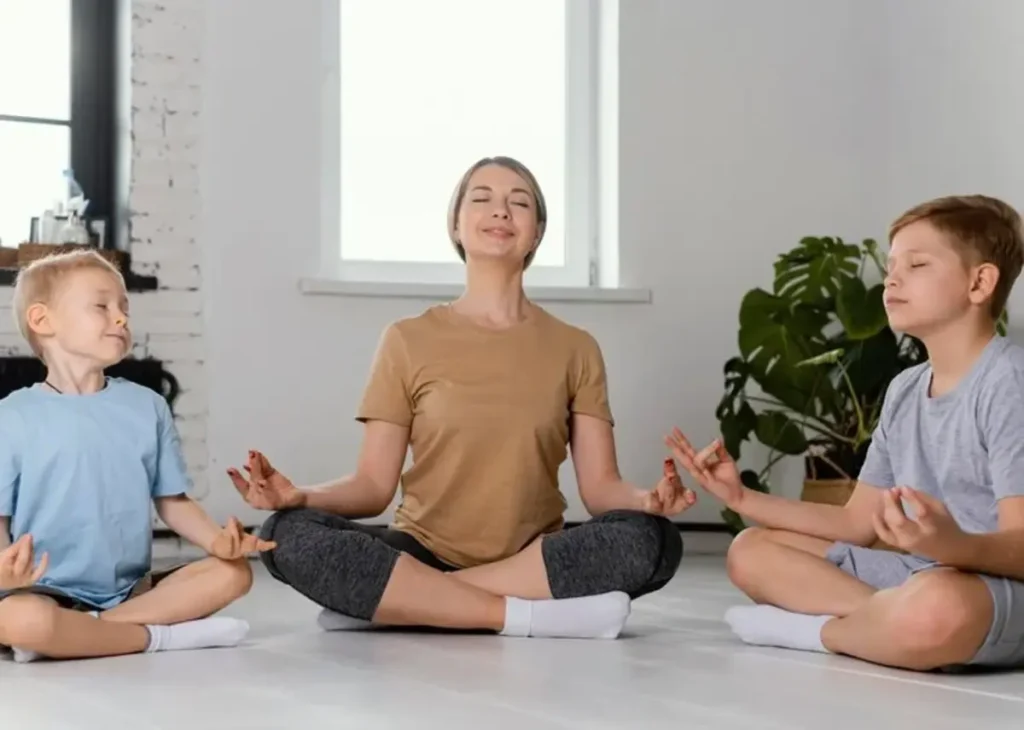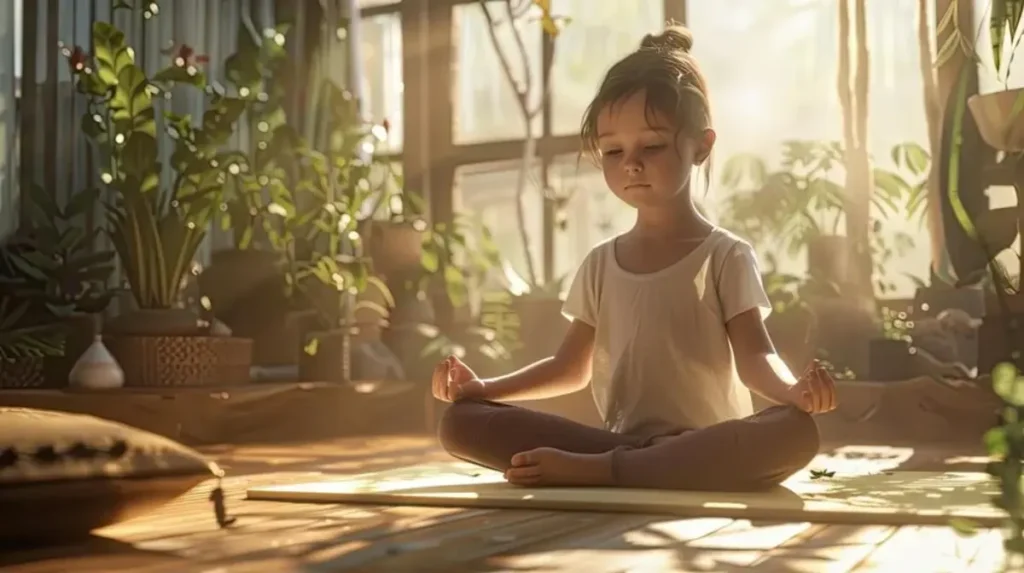-
129, Block-A Bangur Avenue, Mousumi Appartment, Kolkata 700055
129, Block-A Bangur Avenue, Mousumi Appartment, Kolkata 700055

Discover how meditation for kids can boost emotional well-being, improve focus, and reduce stress. Learn tips, benefits, and expert insights from one of the best psychological counselors in Kolkata.

In today’s world, the emotional well-being of children has become an increasingly important topic. From academic pressures to social challenges, kids today are facing many stressors at a young age. As a result, finding effective methods to support their mental and emotional health is essential. One such method gaining popularity is meditation for kids, which has proven to offer significant benefits for their emotional well-being. But how exactly can meditation help children, and what makes it such a powerful tool for emotional growth? Let’s explore how meditation can play a pivotal role in enhancing a child’s emotional resilience, focus, and overall mental health.
In recent years, the mental and emotional health of children has become a focal point for parents, educators, and psychological professionals. With increasing concerns about stress, anxiety, and mental health disorders among children, meditation has emerged as a holistic practice that not only calms the mind but also promotes overall emotional well-being.
Studies have shown that meditation can have a profound impact on a child’s ability to cope with stress and develop emotional intelligence. By introducing mindfulness practices like meditation into their routines, children can develop skills that will help them face life’s challenges with a greater sense of balance and emotional control.
Meditation for kids is a simplified version of mindfulness and relaxation techniques that are adapted to suit a child’s cognitive and emotional needs. Unlike adult meditation, which may focus more on abstract concepts or extended sessions, meditation for kids typically involves short, fun, and engaging activities that teach them how to focus, relax, and process their emotions.
Children are taught various techniques such as deep breathing, guided imagery, and body scans, all of which are designed to help them center themselves in the present moment. These practices encourage children to focus on their breath, body sensations, and the world around them, helping them learn how to manage their thoughts and feelings in a calm and focused way.

One of the most significant benefits of meditation for kids is its ability to help them regulate their emotions. Meditation teaches children to become aware of their emotions and respond to them in a healthy way rather than reacting impulsively. This emotional awareness is vital for young children who may otherwise have difficulty expressing or understanding their feelings.
For instance:
By practicing meditation, kids develop an emotional toolkit that helps them navigate challenging emotions like frustration, sadness, and anxiety.
Meditation fosters a sense of inner strength and resilience in children. As children encounter difficult situations, meditation gives them a mental framework to stay grounded. Whether it’s facing a difficult school project, social challenges, or dealing with disappointment, meditation teaches them how to manage their reactions and bounce back from setbacks.
Mindfulness helps children:
When children meditate, they learn to view challenges not as insurmountable hurdles but as opportunities to grow and strengthen their emotional resilience.
In a world full of distractions, children often struggle with maintaining focus. Meditation for kids can improve attention and concentration by teaching them how to be present in the moment. Regular practice of mindfulness helps children stay focused on tasks and enhance their ability to complete assignments with greater efficiency and clarity.
Children who meditate regularly often show greater focus not only in their studies but also in other areas of life, such as sports, music, and interpersonal relationships.
Children, like adults, can experience stress and anxiety. Whether it’s from school pressure, family expectations, or peer relationships, these stressors can affect their emotional health. Meditation provides a calm space for children to relax their minds and bodies, alleviating the physical and emotional symptoms of stress.
By practicing meditation, children can develop healthier coping mechanisms for managing stress and anxiety, which can have lasting benefits for their emotional health.
Meditation isn’t just about calming the mind; it also encourages compassion and empathy. Guided meditation practices that focus on kindness and empathy help children develop a deeper understanding of others’ emotions and perspectives. These practices, often referred to as loving-kindness meditation, encourage kids to extend positive feelings toward themselves and others.
When children practice meditation with an emphasis on empathy, they build stronger, more supportive relationships and learn to approach others with kindness and understanding.
Children, especially younger ones, have shorter attention spans. To keep them engaged, meditation sessions should be brief and fun. Start with short sessions lasting just 2-5 minutes, and gradually increase the duration as your child becomes more comfortable with the practice. Make the experience playful by incorporating imaginative activities like imagining themselves as a tree or a mountain.
Setting up the right environment is crucial for effective meditation. Choose a quiet, comfortable space free from distractions. You can enhance the atmosphere with calming music, soothing lights, or even candles to set a peaceful mood. If your child is drawn to a particular object, such as a soft blanket or favorite toy, allow them to have it nearby during meditation for comfort.
Children’s imaginations are vivid, and meditation can take advantage of this by integrating storytelling. Guided meditations that include visualizations—such as imagining themselves in a peaceful garden or floating on a cloud—can keep children engaged while also teaching them mindfulness. These visualizations can also help children develop a sense of safety and calmness.
Children learn by example. Practice meditation alongside your child to show them that it is a valuable and enjoyable activity. When they see you engaging in meditation, they may be more likely to try it themselves. Share your experiences, explaining how meditation helps you feel calm and focused. This will reinforce the idea that meditation is a positive and beneficial practice.
The key to success in meditation is consistency. Make meditation part of your child’s daily routine, whether it’s first thing in the morning, during a break, or before bed. Consistency allows children to reap the long-term benefits of meditation and makes it a natural part of their lives.
Read here for more:- How Can Mental Awareness Improve Focus for Remote Workers?
Meditation for kids is becoming increasingly popular, and there are several reasons for this. Many schools are beginning to incorporate mindfulness and meditation practices into their curriculum. This is because studies have shown that these practices can improve focus, behavior, and emotional regulation among students.
Additionally, the rise of digital apps and online resources has made it easier for children and parents to access guided meditation sessions specifically designed for kids. These tools offer a range of options, from short meditation sessions to interactive games, making meditation more engaging and accessible.
Children often benefit from structured guidance when learning new practices. A best psychological counselor in Kolkata can offer tailored meditation strategies to help children manage specific emotional challenges such as anxiety, hyperactivity, or low self-esteem. These professionals can also provide parents with valuable resources and insights into incorporating meditation into their child’s routine.
Working with a counselor ensures that meditation is introduced in a way that aligns with the child’s developmental needs and emotional well-being. Counselors can also monitor progress and adjust practices as needed, ensuring the child receives the maximum benefit from the practice.

Children can start practicing simple meditation techniques as early as 3-4 years old. Practices like mindful breathing and focusing on a calming object are ideal for younger children.
Start with 5-10 minutes a day, and gradually increase the duration as your child becomes more comfortable with the practice.
Yes, meditation can help children with hyperactivity by teaching them how to calm their minds and regulate their energy. Techniques like focused breathing and body scans can encourage children to settle down.
While daily practice is ideal, even a few times a week can provide benefits. Consistency helps children develop a habit, but meditation should not feel like a chore.
Make meditation fun by incorporating stories, visualizations, and creative activities. Keep sessions short and engaging, and avoid pressuring them to meditate.
Meditation for kids is a transformative practice that helps nurture emotional well-being, enhance focus, and build resilience. By introducing children to meditation, parents can equip them with valuable tools to manage stress, regulate emotions, and navigate the complexities of growing up. With consistent practice and the right guidance, meditation can become a lifelong habit that contributes to a healthier, more balanced life for children.
Whether practiced at home or with the guidance of a best psychological counselor in Kolkata, meditation is a powerful tool that can support emotional growth, self-awareness, and overall well-being.